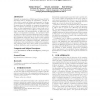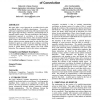170 search results - page 3 / 34 » Interaction Biases in Multi-Agent Simulations: An Experiment... |
GECCO
2005
Springer
13 years 11 months ago
2005
Springer
Researchers of HIV-1 are today, still unable to determine exactly the biological mechanisms that cause AIDS. Various mechanisms have been hypothesized and their existences have be...
HAPTICS
2010
IEEE
13 years 3 months ago
2010
IEEE
In haptic length perception biases occur that have previously been shown to depend on stimulus orientation and stimulus length. We propose that these biases arise from the muscular...
CHI
2007
ACM
14 years 5 months ago
2007
ACM
In this paper we discuss the problems faced when trying to design an evaluation protocol for a multimodal system using novel input modalities and in a new domain. In particular, w...
ATAL
2007
Springer
13 years 11 months ago
2007
Springer
Research on organization of Multi-Agent Systems (M.A.S.) has shown that by adapting its organization, a M.A.S. is better able to operate in dynamic environments. In this paper we ...
GECCO
2005
Springer
13 years 11 months ago
2005
Springer
This paper offers a novel approach to coevolution based on the sociological theory of symbolic interactionism. It provides a multi-agent computational model along with experimenta...


